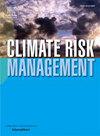Livelihood diversification among women farmers in Nigeria’s flood-resilient drylands
IF 5
2区 环境科学与生态学
Q1 ENVIRONMENTAL SCIENCES
引用次数: 0
Abstract
Jigawa State, Nigeria, faces increasing vulnerability to recurrent floods, highlighting the need for alternative socio-economic strategies to enhance livelihood diversification and strengthen the resilience of the most vulnerable groups, particularly women farmers. This study explores the role of livelihood diversification in flood resilience through three key questions: (1) How frequent are floods in northern Nigeria, and what are their perceived impacts? (2) What livelihood diversification strategies do women farmers employ? and (3) What factors enable or hinder the adoption of diversified livelihoods? Data was collected via focus group discussions with women farmers from three communities, supplemented by semi-structured interviews with community leaders and institutional stakeholders, and analysed using coding and content analysis. Results on reported perceptions show that from 2013 to 2023 communities experienced an average of seven flood events, causing significant damage to homes and farmland. Women farmers diversify livelihoods by rotating fast-growing crops (e.g., beans, tomatoes, cassava), planting economic trees, raising livestock, and engaging in off-farm activities like petty trading. Enabling factors include building farmer and institutional stakeholders’ capacity, improving climate data access, supporting alternative income activities, strengthening agricultural extension, and providing infrastructural and financial support. However, barriers such as limited access to capital, agricultural insurance, and inequalities in resource distribution among women, along with cultural dynamics and conflicts, hinder progress. Awareness-raising and capacity-building are essential to overcoming these challenges and addressing social barriers. Additionally, limited institutional coordination and inadequate budgetary allocations exacerbate difficulties in achieving effective livelihood diversification for flood resilience. By revealing the factors influencing the resilience and vulnerability of rural women amid recurring floods in dryland Africa, the lessons learned help bridge key knowledge gaps and highlight essential enablers for strengthening adaptive capacities in flood-prone areas.

尼日利亚抗洪旱地女农民的生计多样化
尼日利亚吉加瓦州越来越容易受到经常性洪水的影响,这凸显了制定替代性社会经济战略的必要性,以促进生计多样化,并加强最脆弱群体(尤其是女性农民)的抵御能力。本研究通过三个关键问题探讨了生计多样化在抗洪能力中的作用:(1)尼日利亚北部洪水的频率,以及它们的感知影响是什么?(2)女性农民采用了哪些生计多样化策略?(3)是什么因素促成或阻碍了多样化生计的采用?通过与三个社区的女农民进行焦点小组讨论收集数据,辅以与社区领导人和机构利益相关者的半结构化访谈,并使用编码和内容分析对数据进行分析。报告感知的结果显示,从2013年到2023年,社区平均经历了7次洪水事件,对房屋和农田造成了严重破坏。女性农民通过轮种速生作物(如豆类、西红柿、木薯)、种植经济树木、饲养牲畜以及从事小额贸易等非农活动,使生计多样化。促进因素包括建设农民和机构利益相关者的能力、改善气候数据获取、支持替代收入活动、加强农业推广以及提供基础设施和财政支持。然而,诸如获得资本、农业保险的机会有限、妇女之间资源分配的不平等以及文化动态和冲突等障碍阻碍了进展。提高认识和能力建设对于克服这些挑战和消除社会障碍至关重要。此外,机构协调有限和预算拨款不足加剧了实现有效生计多样化以增强抗洪能力的困难。通过揭示影响农村妇女在非洲旱地反复发生洪水时的复原力和脆弱性的因素,吸取的经验教训有助于弥合关键的知识差距,并突出强调加强洪水易发地区适应能力的关键推动因素。
本文章由计算机程序翻译,如有差异,请以英文原文为准。
求助全文
约1分钟内获得全文
求助全文
来源期刊

Climate Risk Management
Earth and Planetary Sciences-Atmospheric Science
CiteScore
8.20
自引率
4.50%
发文量
76
审稿时长
30 weeks
期刊介绍:
Climate Risk Management publishes original scientific contributions, state-of-the-art reviews and reports of practical experience on the use of knowledge and information regarding the consequences of climate variability and climate change in decision and policy making on climate change responses from the near- to long-term.
The concept of climate risk management refers to activities and methods that are used by individuals, organizations, and institutions to facilitate climate-resilient decision-making. Its objective is to promote sustainable development by maximizing the beneficial impacts of climate change responses and minimizing negative impacts across the full spectrum of geographies and sectors that are potentially affected by the changing climate.
 求助内容:
求助内容: 应助结果提醒方式:
应助结果提醒方式:


